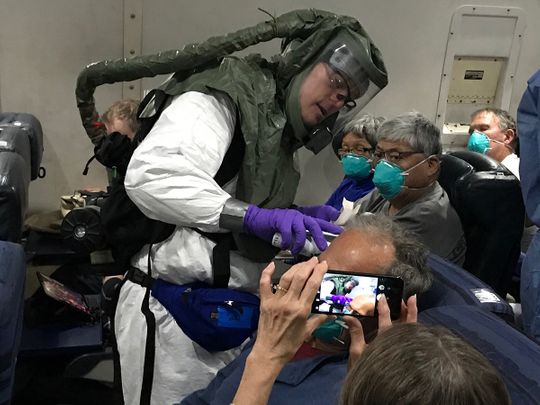
In the 19th century, towns across the American South guarded themselves against yellow fever by refusing to allow anyone in. And in 1918, some towns shut down transportation and set up quarantines to keep out the Spanish flu.
But in outbreaks of disease since, states have largely asserted themselves as the authorities in the fight against contagion.
So the situation that unfolded Monday in a packed federal courtroom in Santa Ana, California, was unusual: The city of Costa Mesa was pleading that a judge block California from moving people infected with the new coronavirus into a state-owned facility in the city, where they would remain in isolation while recovering.
"This is a new one in terms of claiming a right not to have infectious disease introduced into your community," said Polly Price, a professor of law and global public health at Emory University. Although cities and towns once claimed "an absolute right" to guard against disease, she said, state-level control over isolation and quarantine has been the norm for more than a century.
In a decision that could complicate California's efforts to deal with the coronavirus crisis, Judge Josephine L. Staton on Monday kept a temporary restraining order in place that would prevent the infected patients from being moved to Costa Mesa. The judge said she would reconsider the issue after state and federal authorities provide more details about how they plan to protect the health of the community, as well as the people with coronavirus. She set a hearing for March 2.
"The state has shown great empathy for the patients," the judge said in a ruling that drew applause, adding that she wanted to see "the same empathy for the residents of Costa Mesa."
It was uncertain exactly how many people California intended to move into the facility in Costa Mesa, but they are among the 53 people in the United States who have tested positive for the virus, according to the Centers for Disease and Control Prevention. Nearly all of those people had traveled to Asia, and many of them have been staying on American military bases since returning to the United States on government-arranged flights.
In recent days, officials had announced that infected Americans at Travis Air Force Base who were not ill enough to be hospitalized would have to leave the base in Fairfield, California. Many of them had been evacuated from a cruise ship in Japan.
The proposal had set off a flurry of objections from Costa Mesa residents, who filled the courtroom to watch local officials argue that patients infected with coronavirus should not be brought to a former residential home for developmentally disabled people. The area, which is in Orange County, is too heavily populated to host people infected with such a dangerous virus, the local officials argued.
Given the Costa Mesa area's popularity with tourists, "you almost couldn't pick a better disease vector," said Jennifer L. Keller, a lawyer hired by Costa Mesa to try to block the transfer.
Staton, of the U.S. District Court for the Central District of California, pressed state officials to explain why it selected "a facility in the second-most populated county in the state of California."
The state's lawyers argued that officials in Costa Mesa have no legal right - or good reason - to block the move, which the state said involved frail and elderly patients.
Authorities in California selected the site after the Department of Defense informed them that patients who tested positive for the virus could no longer stay at Travis Air Force Base. Federal officials had planned to move the patients to a facility in Alabama operated by the Federal Emergency Management Agency, court documents said, but officials in California thought that moving the group out of the state - most of the patients are said to be California residents - would be detrimental to their health and well-being.
"The forced relocation of these Californian residents from California to Alabama for the duration of their isolation period, after having already undergone quarantine for weeks on a cruise ship, poses health risks to these repatriated individuals, many of whom are over the age of 65 and have chronic underlying conditions," wrote Xavier Becerra, the attorney general of California.
Complicating matters, Alabama officials also have objected to the prospect of housing the patients. Gov. Kay Ivey, a Republican, had raised concerns about the idea and said Sunday that President Donald Trump promised her that the patients would not be sent to her state.
Other options, Becerra wrote, were to put patients up in hotels near Travis Air Force Base or send them to hospitals, where there was a risk of infecting other patients. Other sites, including the Sonoma Developmental Center, Army National Guard Camp Roberts and closed youth correctional facilities, were considered and dismissed, he said.
The possibility of a "local veto" on deciding where to house patients would "fly in the face of a compelling need for a centralized state authority to control and manage communicable disease outbreaks," Becerra wrote.
The standoff over where to send the patients underscored the unwieldy, decentralized nature of the U.S. health system, even as federal authorities were warning of serious risks from the coronavirus outbreak, which has killed more than 2,000 people in China. The federal government generally relies on states to carry out quarantine orders, and states are within their rights to refuse. Quiet negotiations often take place when it comes to isolating tuberculosis patients, with federal officials persuading states to house them. But cities cannot generally refuse a state's order to assist.








